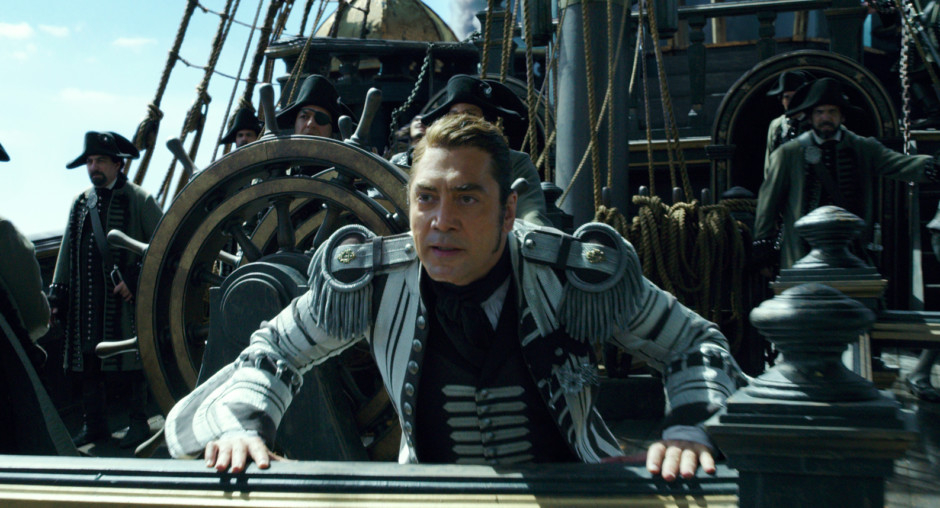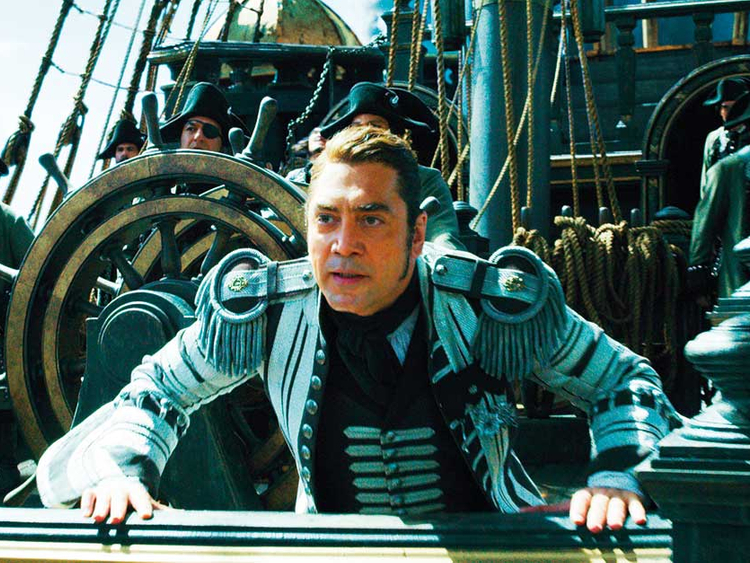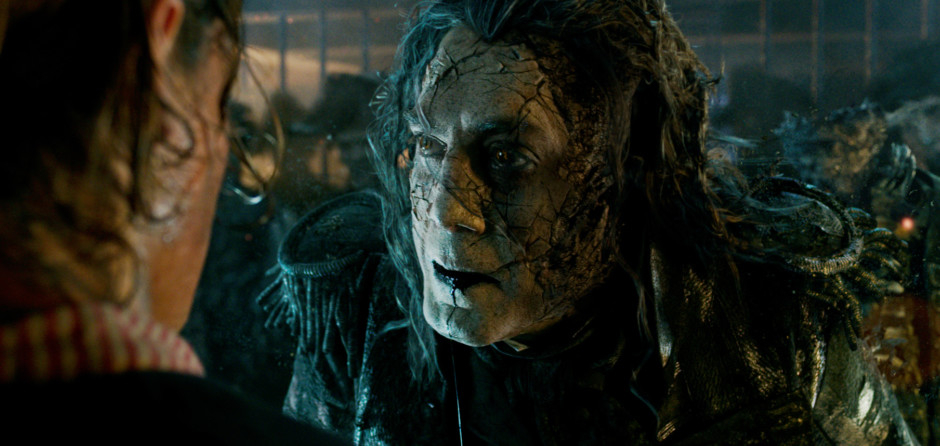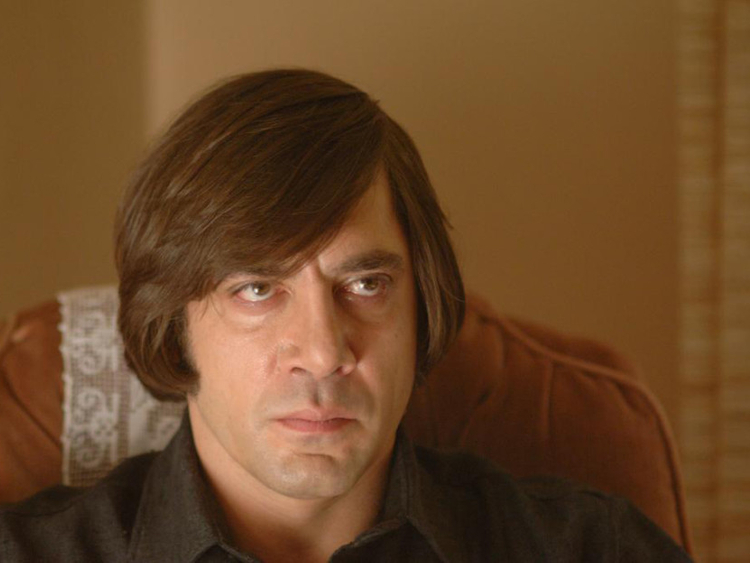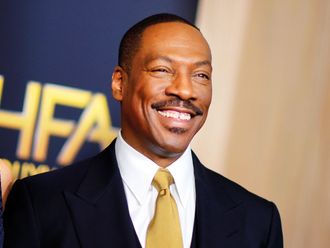Describe almost anyone else as having a face for cinema and it could only be a compliment. With Javier Bardem, it’s more a matter of logistics.
The Spanish actor has the kind of features that look as if they’re being projected in widescreen even when he’s sitting on the other side of a coffee table: there’s a Himalayan grandeur to the experience of watching him talk that makes you want to snap on a pair of crampons and strap panniers across the nearest yak. At least, that’s how things feel in the hyperreal surroundings of Disneyland Paris — where, in a bright blue room, over sparkling mineral water and a bowl of walnuts, Bardem has come to discuss the fifth and latest Pirates of the Caribbean film.
Admirers of his work in Skyfall and No Country for Old Men may not be stunned to hear he plays the villain, Capitan Armando Salazar: a fanatical pirate hunter whose desperation to skewer Johnny Depp’s character, a buccaneer he calls “Yuck Spurroh” in a deluxe Iberian purr, has sustained him beyond death.
‘No Country for Old Men’ (2007).
In person as on screen, Bardem’s visage can’t be ignored, though he talks about it with breezy good humour. “I have a big face, that’s for sure,” he says. “When I look into the mirror, I’m always like, ‘Wow. That’s a big head’.”
It’s a natural asset, though one that’s taken time to master: “I feel the closer the camera goes to my face, the deeper the mask I have to take off.”
That face is, of course, a happy accident of genetics, with a little help from a bar fight in which he broke his nose at the age of 19 — but its expressive potency is down to hard work that began a year earlier, when he took his first acting course in Madrid. He still takes month-long workshops today, with the same teacher, the Argentinian acting coach Juan Carlos Corazza, whom he mines for advice on every film.
‘Skyfall’ (2012).
In one sense, his part in Pirates V is another classic, lip-licking Eurovillain in the vein of Skyfall’s Raoul Silva: his vision for Salazar was “a mixture of a wounded bull — sword hanging from his back, bleeding in the arena, mucus falling from his mouth — and a flamenco singer, singing about pain and mourning and suffering”.
Very Spanish, and very Bardem — though in terms of technique, the character is a plunge into uncharted waters. It’s the first role in the 48-year-old’s career in which his face is covered almost entirely by make-up and computer graphics; for Bardem, both the challenge and appeal of it was to see if he could make the meat and gristle of his own performance penetrate that caved-in mask.
He was reassured by early tests: “You could tell that the texture of the make-up allowed the face to move and be present,” he says, twisting up his face as he talks. “And I felt relief, like, ‘OK, I will still exist’.”
‘Pirates of the Caribbean: Dead Men Tell No Tales’ (2017).
The character’s hair — a tangle of tendrils which trace his movements as if drifting underwater — was all CGI. “I knew from the drawings that they would create a soft, kind of hypnotic movement, so I played with it. That’s why in the film I keep doing this,” he says, snapping his head to one side with a crocodilian leer, then holding the pose as the imaginary hair catches up.
Having to depend on his imagination on set, he says, made him feel pangs of sympathy for his children — Leonard, six, and Luna, four — when he and Penelope Cruz, his wife of close to seven years, ask them to perform impromptu party pieces for visitors. “You go to your kids and say ‘Do something for the guests’, and of course the kids are like, ‘What the [expletive] are you talking about?’,” he says. “While the adults just stand there looking at them to see what they do.”
Those inhibitions took a while to shake off, he admits, “but after a while I had re-educated myself and could find joy in it. At the end of the day, that’s the reason you are an actor. To imagine.”
Actors ploughing their own furies and neuroses into their work is a practice he doesn’t have a lot of time for: “If it’s always about you, you, you, then you need to go to a therapist, not a movie set,” he says. In fact, Bardem does both: he sees two therapists, one English-speaker and one Hispanophone, in part to ensure that his inner self remains off-screen.
“I do therapy, and I think every actor should,” he says. “Because then you don’t use your work as something to put your [expletive] in. Those characters don’t need it. What they need is for you to be generous enough to go to their [expletive], in the imaginary realm. Otherwise, it becomes just you, constantly doing the same character on and on.”
Married life
None the less, his personal life — or rather, the woman at the heart of it — evidently holds an extraordinary sway over his work. Bardem met Cruz on the set of the comedy Jamon Jamon, his breakthrough film, in 1992. But they only became romantically involved while filming Woody Allen’s Vicky Cristina Barcelona, 15 years later. It was thanks largely to Cruz that Bardem thought the fifth Pirates film would be worth his while.
He’d visited her on the set of the fourth instalment, On Stranger Tides, in London, Los Angeles and Hawaii, and had been impressed by the attention to detail. (She returned the favour, and came to visit him in Queensland, Australia.) The couple are the only Spanish actors to have yet won Oscars (Bardem’s was for No Country for Old Men), or to have even been nominated. They’re also frequent co-stars, and will next appear together in Bardem’s long-gestating passion project Escobar, a drama about the Colombian drug baron’s romance with the journalist Virginia Vallejo, which his salary from Pirates helped make possible.
“You do it so you can spend two years without earning a penny,” he says, though adds he couldn’t take on a role if he didn’t also have faith in it artistically: “When you are in front of the camera, you had better believe in what you are doing, otherwise you are [expletive].”
Bardem has been tapped up to play Pablo Escobar many times before, but didn’t want to portray him as a swaggering bad-boy kingpin. “I’m not saying he needs to be honoured, but behind every monster is a human being,” he says. “If we don’t relate to that, we’ll never understand it. And if art, movies, books, paintings, can do anything for us, it’s to help us to understand that we are monsters and they are us.”
Disney had been ready to film Salazar’s Revenge as long ago as 2013, but thanks to the $190 million (Dh697 million) crater of debt left by the studio’s wildly expensive, Johnny Depp-starring reboot of The Lone Ranger, the film was temporarily shelved while the studio took stock. The cameras eventually started rolling in early 2015 and kept going for 95 days, a period prolonged by Depp’s various travails: not least the prosecution of his ex-wife, Amber Heard, for bringing the couple’s pet dogs into Australia on a private jet without putting them through quarantine, and an injury to his hand that caused a two-week delay to filming. (Heard reportedly told friends Depp sustained the injury when he punched a wall during an argument with her.)
An article in The Hollywood Reporter earlier this month also quoted “sources close to the production” saying Depp was constantly late on set. By contrast, Espen Sandberg, the film’s co-director, says Bardem was, “extremely hard-working... in our book, he’s one of the world’s best”.
At times Bardem says, with scenes advancing at a snail’s pace on set, it could be hard to maintain focus. He talks about killing time by wandering around one of the ships and picking up a plate only to see a “beautiful” engraving in the table underneath that had been done by a member of the art department, even though it had no chance of ever being seen on screen.
“That was the kind of thing you have to honour in your work,” he says. His Pirates pay cheque also doubtless helped cover a £129,000 (Dh609,906) penalty imposed earlier this month for what the Spanish press reported as “tax avoidance” at a production company Bardem owned between 2006 and 2007. A recent audit by the Spanish Treasury found a shortfall in the company’s tax contributions — a minor flub in the scheme of things, but one that painted a target on the actor, who had marched against the Spanish government’s programme of austerity, including tax hikes, in 2012.
Bardem describes the discrepancy as a genuine error he was happy to rectify and says he will continue to protest austerity and remain politically active. He concedes he’s somewhat insulated from the sharp end of politics — “It’s very easy for me to say this in Disneyland” — and notes other members of the Bardem dynasty have been less fortunate.
His uncle, the director Juan Antonio Bardem, was imprisoned on political charges by the Franco regime in 1955, and learnt that his film Death of a Cyclist had won the critics’ prize at Cannes from his cell. The youngest of three children, Bardem was born in 1969 in the Canary Isles and was raised in Madrid by his mother, the respected Spanish actor Pilar Bardem, after she and his father divorced when Bardem was two. He tried painting and rugby — playing briefly for the Spanish national team — before reverting to the family trade.
He grew up watching Spanish actors such as Francisco “Paco” Rabal and Jose Bodalo — “very honest, sometimes too theatrical for me, but always deeply felt” — and recalls the lightning-bolt moment when, age 12, his father took him to see Raging Bull and believing for the entirety of Martin Scorsese’s film that Robert De Niro was a professional boxer. (“I was from a family of actors, I knew what acting looked like, and that wasn’t it.”)
“And I was like, ‘How do you do that?’ And I started to study De Niro, Al Pacino, Marlon Brando, Dustin Hoffman.”
His Pirates co-star Geoffrey Rush — who plays the buccaneering Hector Barbossa — says that what struck him about Bardem was “how multifaceted he is. As an actor you think, ‘Have I only got one inner villain?’, but I had very strong memories of how creepy, dangerous and weird he was in No Country for Old Men.”
Before their first scene together, Bardem hadn’t told Rush about one of Salazar’s memorable tics — as he speaks, black slime seeps from his mouth — and Rush’s expression of disgust is genuine. For Bardem, those sparks on set — the stuff that results from careful scheming, but itself can’t be planned — is what gives any film, from Pirates to No Country, its rationale and spark. “With any actor, that’s the place you want to be in,” he says with a spreading smile. “They know who they are, I know who I am, we know what we want from each other. Now, let’s play tennis.”



